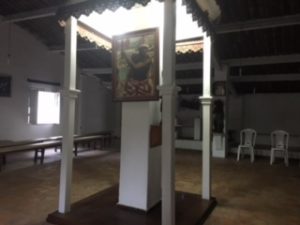Today during class at the Institute of Collective Health we learned about the structure of the Unified Health System (SUS) that exists in Brazil. The Unified Health system was created to give all Brazilians the “right to healthcare”. This system is entirely free for those that use its services and incorporates many preventive medicine ideals. Some of these ideals include primary health care teams that go from house to house to ensure vaccination compliance and to collect demographic information. Other facilities include mental health centers where users of the system can receive therapy and holistic care, and pharmacies where users of the system can receive some free medicines.
We visited a candomblé house called, “Terreiro Casa Branca“. Candomblé is an Afro-Brazilian religion that originated after slaves were brought over to Brazil from Africa during the 16th century. Many of the slaves were from different African tribes and did not speak the same language or have the same religion. Candomblé was a way to unite the slaves and to give many a sense of family. In this religion, there is a God figure called Olorun and other deities or “orixás” are celebrated as well to include Yemanjá, Xango, Oxum, Oxossi and others. Today, candomblé is still widely practiced in Brazil. At Terreiro Casa Branca, we received a tour of this small candomblé house and saw how the participants of this religion live their daily lives. The assistant to the high priestess of this candomblé house taught us about how they specially prepare foods for ceremonies and how people in the religion are supposed to live.
After our tour, we went back to ACBEU to meet Brazilian students that were learning English. This was a great opportunity for us, the American students, to practice their Portuguese and for the Brazilian students to practice their English. There was great opportunity for cultural exchange as well with discussions about favorite artists in your native places and traditional dishes from those places.




I love that you guys had an opportunity to do intercultural exchange with the Brazilian students. Candomble is such a fascinating cultural tradition and religion.